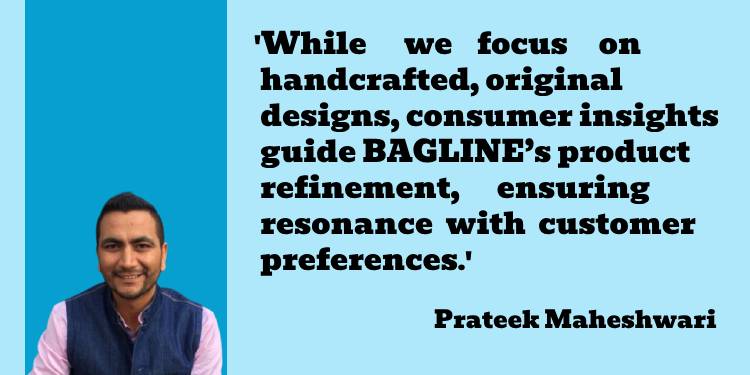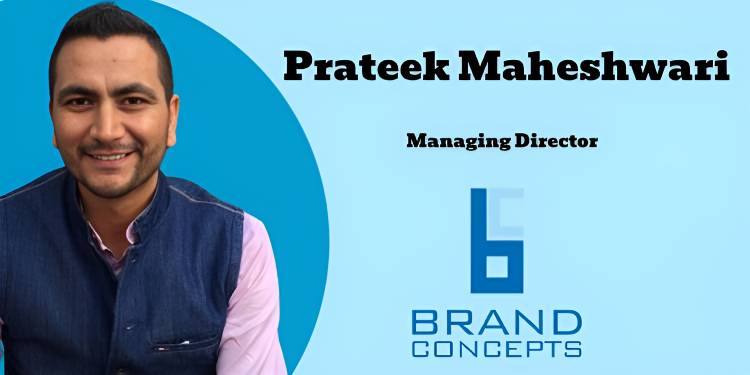Bagline, the flagship retail brand of Brand Concepts Ltd., is a premium multi-brand destination offering a curated collection of bags, luggage, and accessories for modern consumers who seek style, functionality, and affordability. With a focus on transforming travel gear into fashion-forward essentials, Bagline aims to be India’s go-to brand for fashionable travel solutions. The product range includes hard-shell and soft-shell luggage, cabin and check-in bags, backpacks, handbags, and accessories like wallets, belts, and travel organizers.
Bagline has taken a tech-driven approach to enhance the customer shopping experience. The Mumbai digital store allows customers to browse the brand’s entire inventory across all stores and warehouses using digital kiosks, ensuring they can access every product, even those not physically available in-store. This omnichannel strategy bridges the gap between physical and online shopping, making the purchasing process seamless and convenient for customers. With plans to rapidly scale its store count to 100 by the next financial year, Bagline is on a growth trajectory to become a leading player in India’s lifestyle and travel retail segment.
By offering a unique mix of style and functionality, Bagline caters to travel enthusiasts, working professionals, students, and fashion-conscious shoppers.
MediaNews4U caught up with Prateek Maheshwari, Managing Director at Brand Concepts Limited
Q1. What marketing activities did Bagline do in 2024 to create awareness about its products?
In 2024, BAGLINE implemented a multi-channel marketing strategy to enhance brand awareness. We leveraged targeted digital campaigns, influencer collaborations, and engaging in-store activations to highlight our stylish and affordable offerings.
Brand Concepts Ltd.’s entry into the quick commerce space was a key milestone by listing marquee-licensed brands like Tommy Hilfiger Travel Gear, United Colors of Benetton, and Aeropostale on Zepto, boosting accessibility and visibility.
We also launched localized campaigns around new store openings in cities like Jodhpur, Ahmedabad, and Pune, further strengthening our presence and driving customer engagement.
Q2. What marketing channels and vehicles work best to reach NCCS A? Is that the main TG for Bagline?
At BAGLINE, reaching our core target audience—NCCS A consumers—is all about using a blend of premium digital platforms and exclusive offline experiences. Our marketing is anchored in connecting with aspirational, fashion-forward consumers who value quality, style, and convenience.
We leverage Instagram and influencer partnerships to craft engaging visual stories that resonate with this group. Additionally, our collaboration with quick commerce platforms like Zepto brings our marquee brands directly to their fingertips, making curated premium travel gear and lifestyle accessories more accessible.
In-store activations at strategic locations add another layer to this approach, creating a seamless, premium experience for customers seeking style and convenience. These integrated channels help us build a strong connection with our core audience, ensuring we’re always top of mind.
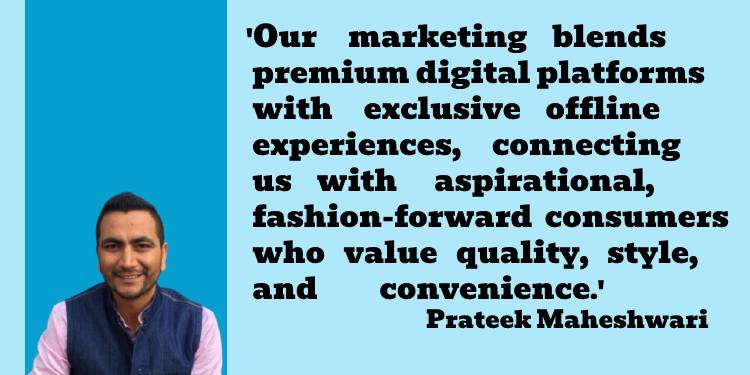
Q3. Do lifestyle influencers play an important role in helping the company stand out?
Lifestyle influencers are a key driver in helping BAGLINE stand out. Their authentic connection with audiences allows us to showcase our products in real-life contexts, making them feel more relatable and desirable. By partnering with influencers who align with our brand values of style and quality, we have been able to amplify our reach and build trust with a discerning audience. These collaborations create a ripple effect, where our products are not just seen but truly experienced and celebrated.
Q4. Luxury goods sales have withstood economic pressures like inflation in recent years. Has this trend also been seen in the luxury travel gear and lifestyle accessories category? If so, why?
Yes, the trend of luxury goods withstanding economic pressures has certainly extended to the luxury travel gear and lifestyle accessories category. Consumers are increasingly viewing high-quality, durable products as long-term investments, especially in times of economic uncertainty. BAGLINE has benefited from this shift, as more people prioritize quality and functionality without compromising on style. The growing demand for premium travel gear and accessories is driven by a mix of rising disposable incomes and an increased focus on experiences, where curated premium travel gear becomes an extension of personal identity.
Q5. Could you shed light on the strategy to grow partnerships with brands like Tommy Hilfiger Travel Gear, United Colors of Benetton, and Aeropostale? Is this a revenue-sharing arrangement? What is the business model?
At Brand Concepts Ltd., our strategy to grow partnerships with iconic brands like Tommy Hilfiger Travel Gear, United Colors of Benetton, and Aeropostale is built on mutual trust and long-term collaboration. We focus on creating synergies where both parties benefit, ensuring the brands’ values are aligned with our offerings. Rather than a simple revenue-sharing model, our approach is centred around exclusive licensing agreements, allowing us to manage the design, manufacturing, and retail of these products in India. This model gives us control over quality and distribution, ensuring that these global brands maintain their premium image while tapping into the growing demand for curated premium travel gear and lifestyle accessories in India.
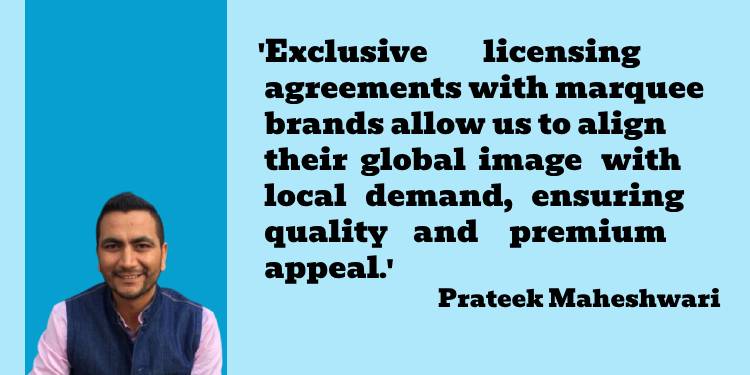
Q6. Tourism and corporate travel is the one category where consumer spending has risen while some other sectors like auto have struggled. How is Bagline benefitting from this? Which are the key markets being targeted for growth?
With the rise in tourism and corporate travel, BAGLINE has seen significant growth as consumers invest in high-quality, stylish travel gear. As travel becomes more frequent and aspirational, demand for our curated premium luggage and accessories has surged. We’re targeting key markets like Mumbai, Delhi, Bangalore, and Pune, where urban consumers are increasingly focused on combining functionality with style. With a growing emphasis on both business and leisure travel, BAGLINE is perfectly positioned to meet the evolving needs of these customers, offering products that enhance their travel experience.
Q7. Could you talk about how quick commerce is impacting the luxury travel gear and lifestyle accessories category? As a result, did the focus of marketing shift to digital this year?
Quick commerce has had a significant impact on the travel gear and lifestyle accessories category by offering instant accessibility to premium products. Consumers now expect convenience, which has accelerated our shift toward digital marketing. This year, BAGLINE focused on quick commerce platforms like Zepto to bring our high-quality products closer to consumers, ensuring they can shop curated premium travel gear and lifestyle accessories on demand. As a result, our marketing efforts have leaned more into digital channels, amplifying our reach through social media, influencer collaborations, and targeted campaigns that highlight the blend of quality and convenience.
Q8. What trends are being seen in terms of physical stores versus Quick Commerce for high-value purchases?
In recent years, we’ve seen a shift where physical stores still play a key role in offering customers a tactile experience, especially for high-value items like premium travel gear. However, quick commerce is increasingly complementing this by providing instant accessibility to curated premium products. Consumers are now looking for the best of both worlds—the in-person touch and immediate delivery. At BAGLINE, we’re blending both strategies, ensuring our stores remain destinations for experiencing high-quality products, while our presence on quick commerce platforms offers a convenient, tech-driven way to shop.
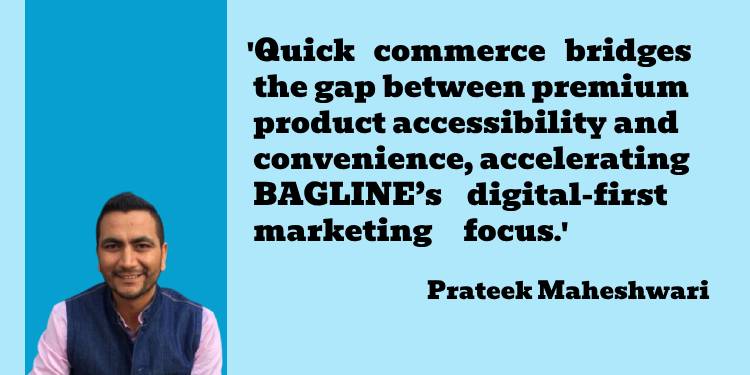
Q9. Are traditional stores still important because consumers want to test out the equipment?
Yes, traditional stores remain crucial, especially for high-value purchases like curated premium travel gear. Consumers want to physically interact with products, feel the quality, and test out functionality before making a decision. At BAGLINE, our stores offer an immersive experience, allowing customers to see and touch the products, ensuring they feel confident in their purchase. This hands-on approach continues to build trust and loyalty, even as digital platforms grow in prominence.
Q10. Could you talk about trends being seen when it comes to Luxury Travel Gear Licensing?
Luxury Travel Gear Licensing has evolved from a brand extension tool to a powerful strategy for revenue generation and market expansion. Initially, licensing allowed brands to enter new markets economically. Now, it opens doors to diverse revenue streams, helping brands leverage their intellectual property creatively. With the Indian licensing market projected to reach USD 14.8 billion by 2027, licensing is becoming a key growth strategy, enhancing brand visibility, loyalty, and consumer engagement.
Q11. What role is AI playing for the company in helping it finetune its product range like luggage trolleys, backpacks, business cases, wallets, belts, women’s handbags, and other fashion accessories? Is AI helping identify market gaps and exploring ways to connect better with consumers?
At BAGLINE, while we incorporate traditional design tools and rely on original, handcrafted designs inspired by real-world sources, we have yet to fully embrace AI for creative tweaks or advertising content. Our design process remains rooted in classic methods, emphasizing craftsmanship and authentic research rather than solely relying on AI-driven analytics. This approach ensures that our product range, from luggage trolleys to handbags, resonates with our customers’ preferences while maintaining the quality and originality we stand for. Although AI isn’t central to our design phase, we continue to refine our offerings through valuable market insights and consumer feedback.
